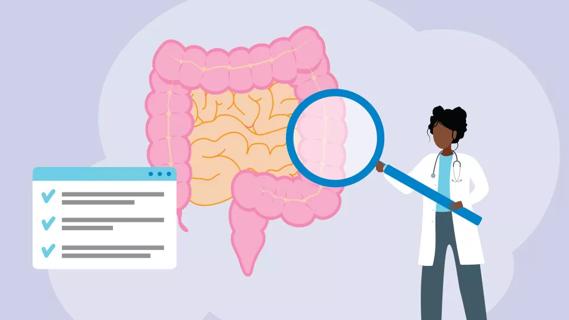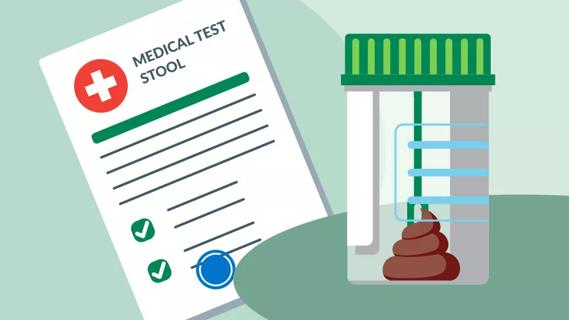Chronic inflammation from flare-ups can damage the lining of your intestinal wall, making your colon more vulnerable to cancer

Living with an inflammatory bowel disease (IBD) can mean facing a new normal. Nutritional plans, lifestyle changes and being physically active regularly can make a world of difference when you’re dealing with flare-ups from ulcerative colitis or Crohn’s disease.
Advertisement
Cleveland Clinic is a non-profit academic medical center. Advertising on our site helps support our mission. We do not endorse non-Cleveland Clinic products or services. Policy
But when these conditions go unnoticed, unmanaged or untreated for long periods of time, they can wreak havoc on your bowels and leave your intestines vulnerable to bigger problems like cancer.
Colorectal surgeon Scott Steele, MD, MBA, explains just how these chronic conditions are linked with colon cancer and what you can do to reduce your risk.
Healthcare providers aren’t entirely sure what causes inflammatory bowel diseases like ulcerative colitis and Crohn’s disease. But they do know that they’re related to a dysfunctional immune response that occurs within your digestive tract.
When you have one of these chronic conditions, you can experience inflammation that builds up and spreads throughout your digestive tract — from your anus through your colon and all the way up to your stomach and small intestine (for Crohn’s).
With each flare-up, inflammation may worsen over time so that it causes damage to the lining of your intestinal walls, leaving them swollen, irritated and often covered in lesions or scar tissue. In an attempt to heal from these attacks, your cells try to recover and regrow. But this can lead to an over-abundance of cell growth resulting in polyps, precancerous growth and colorectal (colon) cancer.
Advertisement
“Anything associated with chronic inflammation is a risk factor for the development of colorectal cancer because chronic inflammation leads to a higher turnover of the lining of the cells in the colon, which may ultimately lead to the development of colorectal cancer,” explains Dr. Steele.
Some studies have found that people who have IBD are six times more likely to develop colorectal cancer than the general population. Recent studies show that IBD-related colorectal cancers have declined in recent decades due to improved cancer screenings and improved inflammation management. But several of the following factors have been identified to increase your risk for colon cancer if you’re living with IBD:
“Certain disease processes go together, and ulcerative colitis and PSC in some patients are connected,” notes Dr. Steele. “When you have PSC, you tend to have more potent or worse colon inflammation and symptoms, which leads to a slightly higher risk of having colon cancer.”
“People who have been diagnosed with ulcerative colitis and Crohn’s disease should be getting exams regularly just to monitor their underlying disease, so they’re probably getting evaluated for colon cancer to begin with,” clarifies Dr. Steele.
“Certainly, if they have biopsies that show dysplasia, or abnormal tissues, we will follow those patients more often up to and including annually or every other year, depending on what the biopsies show.”
That means even if your IBD is in remission, you should still get screened for colon cancer regularly, especially if you haven’t been examined in the last five to 10 years. These screenings can help doctors catch colon cancer even in its precancerous and earliest stages of growth — and, during the examination, they can remove these areas of concern in real time.
“The unique thing about endoscopies is that they can detect tumors when someone is asymptomatic and they’re just at their infancy, at the dysplasia or small polyp stage,” states Dr. Steele.
“Other cancers, like pancreatic cancer, are oftentimes diagnosed at a later stage. But an endoscopy has the ability to detect polyps, early-stage lesions and multiple polyps throughout the colon, or to even give people a peace-of-mind that they don’t have anything growing in their colon.”
Advertisement
If you’re living with IBD, reducing your risk for cancer is directly tied to reducing IBD flare-ups. By focusing on healthy habits and lifestyle changes, you can help lower your risk for cancer by trying the following:
“Certainly, the development of cancer has multiple factors linked to it,” says Dr. Steele. “But it’s important that a healthy lifestyle includes regular screening examinations, and open communication with your healthcare provider is critical. Endoscopy has a role in colon screening and can even save your life.”
Advertisement

Sign up for our Health Essentials emails for expert guidance on nutrition, fitness, sleep, skin care and more.
Learn more about our editorial process.
Advertisement

Focus on exercise, eating healthy and getting regular screenings to help lower your risk

Colonoscopies and sigmoidoscopies are types of endoscopies, procedures that look at the health of your large intestine

A steady increase in cases in those younger than 50 started decades ago

If you’re at average risk, it’s recommended that you get your first colonoscopy at age 45

It’s a slow-moving process that offers an opportunity for early detection and treatment

At-home screening options can be good detection tools, but a colonoscopy remains the gold standard

Knowing your family history and getting a genetic test can help detect colorectal cancer earlier

Get lots of fiber, cut back on red meat and limit your alcohol intake

Even small moments of time outdoors can help reduce stress, boost mood and restore a sense of calm

A correct prescription helps your eyes see clearly — but as natural changes occur, you may need stronger or different eyeglasses

Both are medical emergencies, but they are very distinct events with different causes